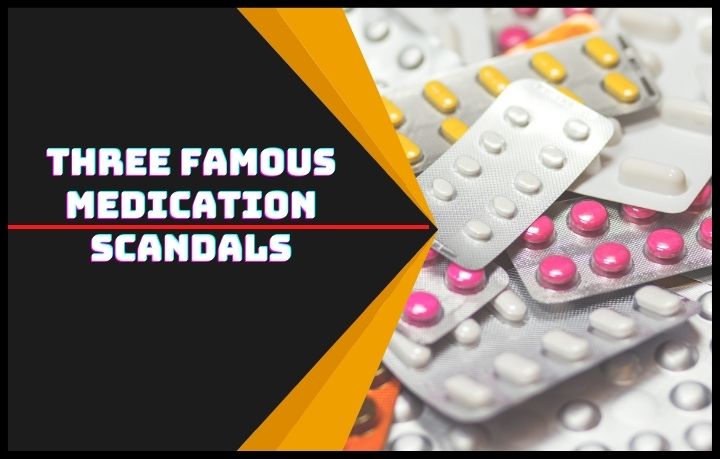Although medication is typically a blessing for society, there have been tragic cases where rogue individuals or irresponsible corporations have caused pain to a drugs’ consumers. Some cases are so grizzly or upsetting that they remain in the public consciousness, and have forever shifted the way we think about the way we distribute, use and think about medication. Here are just three famous medication scandals that will thrill, inform and upset you:

Table of Contents
The “Tylenol Murders” of 1982
Although not the direct fault of the manufacturers of Tylenol, the famous “Tylenol Murders” of 1982 caused a massive shift in how over-the-counter drugs were manufactured and sold forever after. The tragedy began in 1982 when a young 12-year-old girl found herself becoming violently ill after being given an extra capsule of extra-strength Tylenol. Fearing an overdose, her parents rushed her to an emergency room, where she then died and was discovered to have been poisoned by potassium cyanide.
While the tragedy seemed like some freak accident at first, the odd coincidental pairing of Tylenol takers finding themselves seriously ill or dead from potassium cyanide poisonings continued for months, and the makers of Tylenol even found themselves being sent “ransom” notes demanding money to stop the murders. This quickly led authorities to realize that someone was tampering with Tylenol as (or before) it was being put on shelves. No one was ever officially charged with the first batch of murders, but copycat killers did appear occasionally in the years after the original string of deaths.
As a response to the tragedy, the U.S. Congress created the “Tylenol Bill” in 1983, which made it a federal offense to tamper with consumer products and medication (an act that made it easier for federal investigators and prosecutors to take pre-emptive action that would save lives in the coming years). The medication production industry was never quite the same after the “Tylenol Murders” of 1982. However, Tylenol has still seen the occasional controversy.
The Zantac Recall
One of the most famous and recent medication scandals was the sudden and panic-inducing recalls of Zantac in the late 2010s. There were frequent recalls of the drug that was used to treat heartburn and acid reflux issues, due to its potential to cause serious side effects with prolonged usage. In many ways, this acetaminophen-containing antacid can be compared to a much stronger version of Tums, although it was still available over-the-counter. These side effects could range from stomach upsetting conditions to severe, life-threatening conditions such as Cancer.
As the scientific world became more and more aware of how dangerous Zantac was to consumers, the push to get it pulled from shelves completely intensified. Thankfully, the FDA finally requested that manufacturers fully remove and withdraw all over-the-counter and prescription versions of Zantac from the market in 2020. Other brands that used the main ingredient of Zantac (ranitidine), were also affected.
If you still have Zantac in your home, do not use it. Avoiding the medication altogether is key to staying safe. If you were a frequent user of Zantac, and have since found yourself diagnosed with a form of cancer or another serious, costly illness, you should seek qualified, knowledgeable legal representation immediately. The experienced legal professionals at Rosenfeld Injury Lawyers can help you determine what your next steps are, and how they can get you the compensation you deserve.
The Thalidomide Brith Defects Scandal
In the late 1950s and early 1960s, the widespread distribution and medical use of thalidomide around the world caused a huge scandal. It was meant for use as a sedative drug originally, but then marketed and prescribed as a cure for morning sickness in the late 1950s. However, the drug was then recalled and pulled from shelves in 1962 after medical professionals discovered that it had serious abilities to cause birth defects in developing fetuses.
The revelation was a huge blow for what was until then being considered a “wonder drug” by many doctors. At this point in time, medication was not being thoroughly regulated in how it affected pregnant women, and doctors now look back at the time as having been seriously dangerous for pregnant women who were being prescribed new and somewhat-unknown drugs. Many scientists at this point in time were convinced that fetuses could not be significantly affected by drugs taken by the mother at all.
Leading up to its banning in 1962, thalidomide was being used in a whopping 46 countries and was linked to over 10,000 serious birth defects in children, such as phocomelia. The disease caused deformities in the children’s limbs and could affect other parts of the body as well. Unfortunately, it’s suspected that about 1,000 pre-birth deaths can be attributed to thalidomide. 50 years after the sale of the drug ended, the Grunenthal Group, the drug’s creators, finally issued a public apology. Since then, medical professionals have given the proper due diligence to ensure medication given to pregnant people is not harmful to the fetus they are carrying.
You Can Never Be too Safe
Over-the-counter and prescription drugs save many lives every day, and help alleviate millions of users from annoying ailments as well. However, knowing what you’re taking, making sure you’re only using drugs as intended, and never exceeding the doses or usage recommendations of these powerful substances is key to staying safe and healthy. With the right attitude and personal responsibility, you can be that much more assured that you’re using medicine in a proper, safe-as-possible manner.




